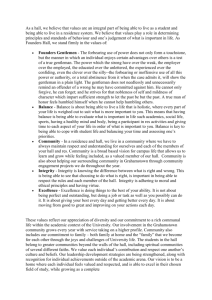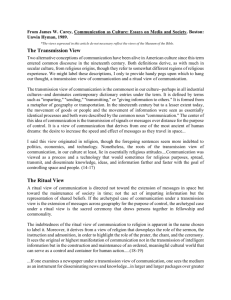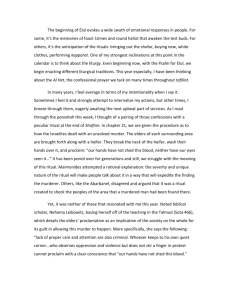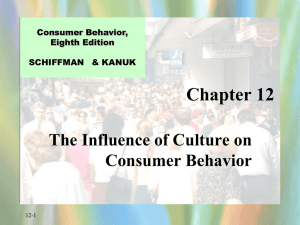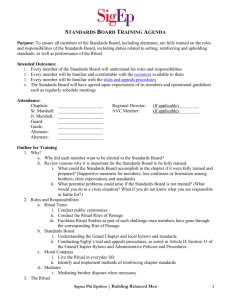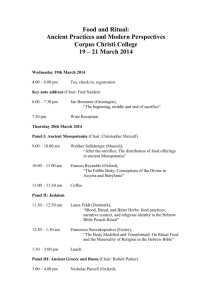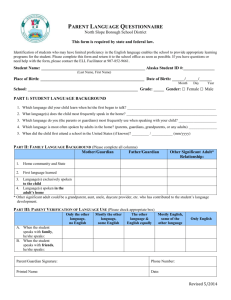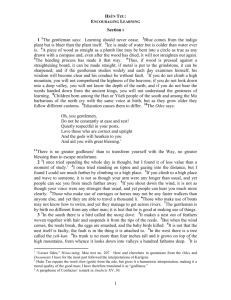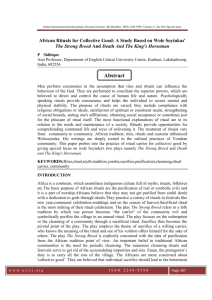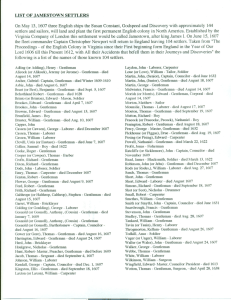Hsun tzu - Your Space
advertisement
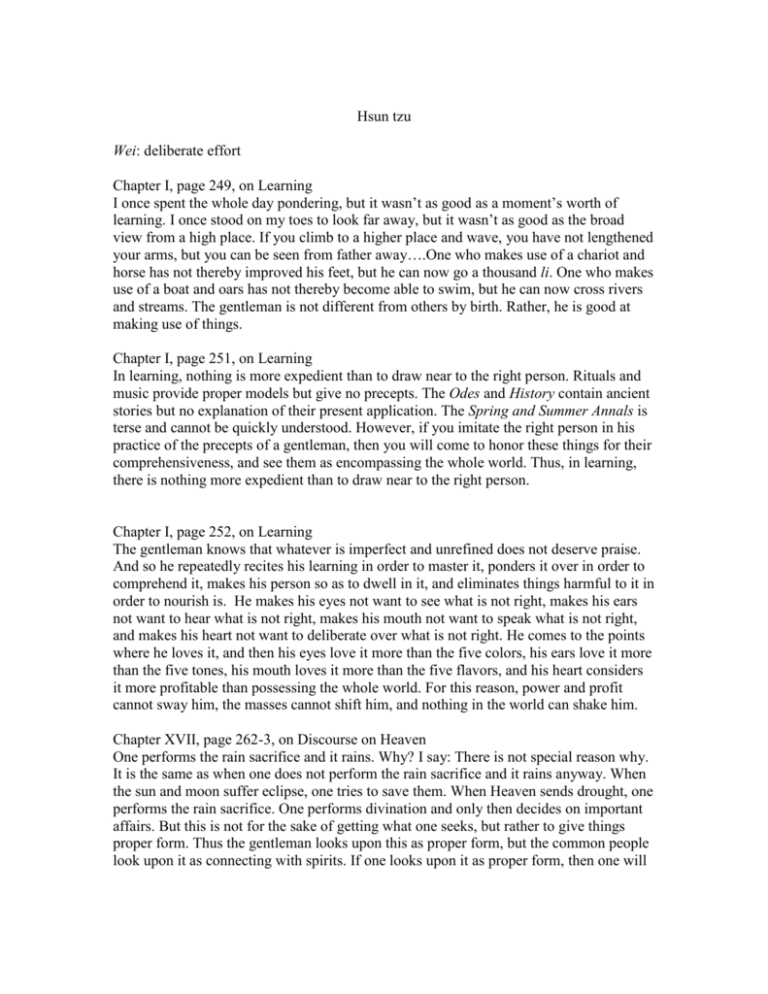
Hsun tzu Wei: deliberate effort Chapter I, page 249, on Learning I once spent the whole day pondering, but it wasn’t as good as a moment’s worth of learning. I once stood on my toes to look far away, but it wasn’t as good as the broad view from a high place. If you climb to a higher place and wave, you have not lengthened your arms, but you can be seen from father away….One who makes use of a chariot and horse has not thereby improved his feet, but he can now go a thousand li. One who makes use of a boat and oars has not thereby become able to swim, but he can now cross rivers and streams. The gentleman is not different from others by birth. Rather, he is good at making use of things. Chapter I, page 251, on Learning In learning, nothing is more expedient than to draw near to the right person. Rituals and music provide proper models but give no precepts. The Odes and History contain ancient stories but no explanation of their present application. The Spring and Summer Annals is terse and cannot be quickly understood. However, if you imitate the right person in his practice of the precepts of a gentleman, then you will come to honor these things for their comprehensiveness, and see them as encompassing the whole world. Thus, in learning, there is nothing more expedient than to draw near to the right person. Chapter I, page 252, on Learning The gentleman knows that whatever is imperfect and unrefined does not deserve praise. And so he repeatedly recites his learning in order to master it, ponders it over in order to comprehend it, makes his person so as to dwell in it, and eliminates things harmful to it in order to nourish is. He makes his eyes not want to see what is not right, makes his ears not want to hear what is not right, makes his mouth not want to speak what is not right, and makes his heart not want to deliberate over what is not right. He comes to the points where he loves it, and then his eyes love it more than the five colors, his ears love it more than the five tones, his mouth loves it more than the five flavors, and his heart considers it more profitable than possessing the whole world. For this reason, power and profit cannot sway him, the masses cannot shift him, and nothing in the world can shake him. Chapter XVII, page 262-3, on Discourse on Heaven One performs the rain sacrifice and it rains. Why? I say: There is not special reason why. It is the same as when one does not perform the rain sacrifice and it rains anyway. When the sun and moon suffer eclipse, one tries to save them. When Heaven sends drought, one performs the rain sacrifice. One performs divination and only then decides on important affairs. But this is not for the sake of getting what one seeks, but rather to give things proper form. Thus the gentleman looks upon this as proper form, but the common people look upon it as connecting with spirits. If one looks upon it as proper form, then one will have good fortune. If one looks upon it as connecting with spirits, then one will have ill fortune. Chapter XIX, page 267, on Ritual If not ritual perfect indeed. It establishes a lofty standard that is the ultimate of its kind, and none under Heaven can add to or subtract from it. In it, the fundamental and the secondary accord with one another, and the beginning and the end match each other. In its differentiations of things, it is the utmost in patterning. In its explanations, it is the utmost in keen discernment….Vast indeed is the principle of ritual. Those expert in creating institutions and the purveyors of perverse, vulgar doctrines, are lost when they try to enter it. High indeed is the principle of ritual! Those who take violent arrogance, haughty indulgence, and contempt of custom for loftiness fall when they try to enter it. Chapter XXII, page 273, on Undoing Fixation Thus if one speaks of it in terms of usefulness, then the Way will consist completely in seeking what is profitable. If one speaks of it in terms of desires, then the Way will consist completely in learning to be satisfied. If one speaks of it in terms of laws, then the Way will consist completely in making arrangements. If one speaks of it in terms of power, then the Way will consist completely in finding what is expedient….These various approaches are all merely one aspect of the Way. As for the Way itself, its substance is constant, yet it covers all changes. No one aspect is sufficient to exhibit it. Chapter XXII, page 279 on Correct Naming Nowadays, the sage kings have passes away, and the preservation of these names has become lax. Strange words have arisen, the names and their corresponding objects are disordered, and the forms of right and wrong are unclear. As a result, even officers who diligently preserve the proper models and scholars who diligently recite the proper order for things are also all thrown into chaos. If there arose a true king, he would surely follow the old names in some cases and create new names in other cases. Thus, one must examine the reason for having names, the proper means for distinguishing like and unlike, and the essential points in establishing names. When different forms make contact with the heart, they make each other understood as different things. If the names and their corresponding objects are tied together in a confused fashion, then the distinction between noble and base will not be clear, and the like and the unlike will not be differentiates. If this is so, then the problem of intentions not being understood will surely happen, and the disaster of affairs being thereby impeded and abandoned will surely occur. Chapter XXII, page 281, on Naming If one tests them against the proper means for distinguishing like and unlike, and observes what happens when they are thoroughly practiced, then one will be able to reject them. Claims such as “Both oxen and horses are not horses” are cases of confusion about the use of names leading to disordering the objects….In every case of deviant sayings and perverse teachings that depart from the correct Way and recklessly innovate, they will belong to one of these three classes of confusion. Thus the enlightened ruler understands their kind and does not dispute with such people. Chapter XXIII, page 284-5, On Human Nature Thus, crooked wood must await steaming and straightening on the shaping frame, and only then does it become straight. Blunt metal must await honing and grinding, and only then does it become sharp. Now since people’s nature is bad, they must await teachers and proper models, and only then do they become correct in their behavior. They must obtain ritual and the standards of righteousness, and only then do they become well ordered. Now without teachers or proper models for people, they will be deviant, dangerous, and incorrect in their behavior….Looking at it in this way, it is clear that people’s nature is bad, and their goodness is a matter of deliberate effort.

